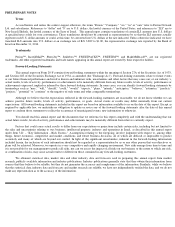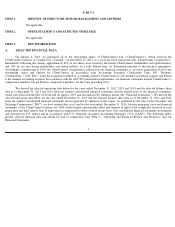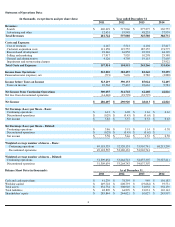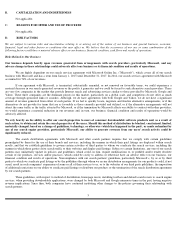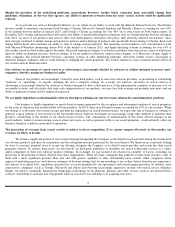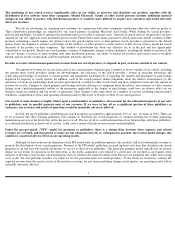Incredimail 2014 Annual Report Download - page 10
Download and view the complete annual report
Please find page 10 of the 2014 Incredimail annual report below. You can navigate through the pages in the report by either clicking on the pages listed below, or by using the keyword search tool below to find specific information within the annual report.
Should the providers of the underlying platforms, particularly browsers, further block, constrain, limit, materially change their
guidelines, technology, or the way they operate, our ability to generate revenues from our users' search activity could be significantly
reduced.
As we provide our services through the Internet, we are reliant on our ability to work with the different Internet browsers. The Internet
browser market is extremely concentrated with Google’s Chrome, Microsoft’s Internet Explorer and Mozilla’
s Firefox accounting for over 85%
of the desktop browser market in January 2015, and Google’
s Chrome accounting for over 48% on its own, based on StatCounter reports. In
December 2013, Google announced that it will restrict the ability to install multi-
purpose extensions onto its Chrome Internet browser starting in
June 2014. As most of our products and services offer such multi-
purpose extensions, this policy shift adversely affected our business. Since
then, Google continued to further change and update its policies and technology in general, and specifically those relating to Chrome. Each such
change further limits and constrains our ability to offer or change search properties. The operating system market is very concentrated as well,
with Microsoft Windows dominating almost 80% of the market as of January 2015, and Apple operating systems accounting for over 14% of
that market, based on StatCounter reports. Recently, Microsoft announced changes to its browser modifier detection criteria, some of which may
limit our ability to maintain our users' browser settings. If we are unable to effectively adapt to these changes, or if Microsoft, Google, Apple or
other companies that provide Internet browsers, operating systems or other underlying platforms, effectively further restrict, discourage or
otherwise hamper companies, like us, from offering or changing the search properties, this would continue to cause a material adverse effect on
our revenue and our financial results.
Our software or provision of search services or advertising is increasingly blocked by software or utilities designed to protect users'
computers, thereby causing our business to suffer.
Some of our products are increasingly viewed by some third parties, such as anti-
virus software providers, as promoting or constituting
"malware" or "spamming," or unjustly changing the user’
s computer settings. As a result, our software, provision of search services or
advertising is increasingly blocked by software or utilities designed to detect such practices. If this phenomenon continues to increase or if we
are unable to detect and effectively deal with such categorization of our products, we may lose both existing and potential new users and our
ability to generate revenues will be negatively impacted.
We are highly dependent on downloadable software developers utilizing our search revenue solution for monetizing their products.
Our business is highly dependent on search-
based revenues generated by the acceptance and subsequent retention of search properties
by the users of otherwise free downloadable software products. In 2014, these search-
based revenues accounted for 85% of our revenues. While
our strategy is to diversify our revenue streams and limit the dependence on search-
based revenues, we expect this line of business to continue to
generate a major portion of our revenues in the foreseeable future. Software developers are increasingly using other methods to monetize their
products, contributing to the decline in our search-
based revenues. The continuation or intensification of this trend, adverse changes in the
search industry, failure to retain existing users or attract new users, as well as generate traffic to our search properties, would adversely affect our
business, financial condition and results of operations.
The generation of revenues from search activity is subject to fierce competition. If we cannot compete effectively in this market, our
revenues are likely to decline.
We obtain a significant portion of our revenues through designating the Company as the default search provider during the download of
our software products and those of our partners and the subsequent searches performed by the users thereof. We therefore are constantly looking
for ways to convince potential users to accept our offering, designate the Company as its default search provider and accept the other search
properties offered. To achieve these goals, we rely heavily on third-party publishers to distribute our search syndication services as a value-
added component of their own software product offerings. In exchange, we pay incentive fees based on a number of factors, including our
projection of the potential revenues derived from these engagements. There are many companies that generate revenue from searches, some of
them with a more significant presence than ours and with greater capability to offer substantially more content. Other companies utilize
aggressive marketing practices and takeover strategies of browser settings that we are unwilling to use as they detract from the user experience,
are contrary to accepted laws, regulations and practices or are not permitted by our agreements with search engine providers. In addition, more
conservative companies (such as Google, Microsoft and others) have become increasingly aggressive in their own search service offerings.
Finally, we need to continually maintain the technological advantage of our platform, products and other services, such as our Search Protect
software, which help us maintain user engagement with our search services and help us in acquiring new users.
6





